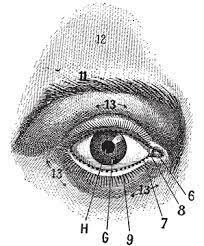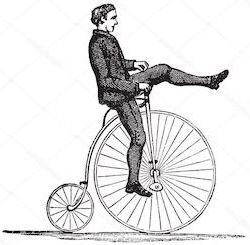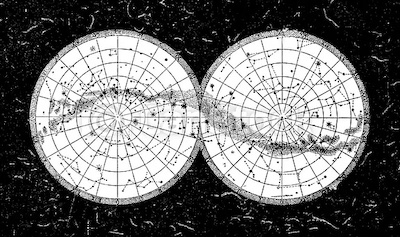Report From the Flatlands of Statistics

Essay by Mathilde Walter Clark
Translated by Colie Hoffman and the author.
I.
I'M IN WALMART in a small town in central Texas, buying socks with my American father. On the wall, alongside a number of other products, firearms hang from metal hooks, assault rifles and semiautomatics packaged in plastic and colored cardboard. It’s a snap that wakes me from a doze. Like most Danes, I'm not used to seeing weapons in real life. A sign on a nearby glass cabinet reads: “In order to serve as many customers as possible, all ammunition sales are limited to three boxes per customer per day.”
My father and I start discussing the Second Amendment of the United States Constitution, which allows individuals the right to bear arms. It's like stepping onto a merry-go-round. As we talk, the fundamental meaning of words like “rights,” “freedom,” and “life” keep shape-shifting, leaving us unable to find common ground. My father ends the discussion by saying that for Americans the right to bear arms is the most basic of rights. It is the right to life, something, he says, I simply don't understand.
My father is right. I don't understand. But perhaps that goes both ways. The discussion is hopeless because it has its roots somewhere before language. Utøya in Norway comes to mind, the most traumatic event to occur in Scandinavia in recent memory. Sixty-nine people, most of them teenagers, were murdered in a shooting spree. But I realize that I can’t bring the Utøya massacre into this discussion. Right there, in the aisles of the supermarket, where cheap firearms hang from metal hooks, I can already hear the counterargument: why would anyone send dozens of young people onto an uninhabited island without protection? That says just about everything Scandinavian about naïveté. Had the youths carried firearms themselves or, at the very least, had the leaders of the summer camp thought of armed security guards, Utøya might never have happened.
Why would anyone send dozens of young people onto an uninhabited island without protection?
This argument has never occurred to me before, and I do not recall hearing it in the wake of Utøya. I Google “Utøya” and I’m right: I can’t find one single individual's-right-to-bear-arms argument. The whole idea seems ludicrous, and when I present this line of thought to my Danish friends as part of a hypothetical discussion, they squirm uncomfortably in their seats. They stare at me in silence as if I really mean what I’m saying, as though these are my own true objections and not those of a hypothetical interlocutor. The idea that people should be able to decide for themselves to get a weapon for protection just doesn’t seem like a real solution to us. I believe it has to do with the individual’s relation to the community: a sense that what we’ve got — whatever that is — here in naïve Scandinavia is easier lost than attained, and that we cannot even talk about it without the risk of losing it. It seems characteristic that the “How could this happen?” that always follows a traumatic event has focused on the contrary: how “One of Us” (the title of the most recent book about the Utøya perpetrator) could so fatally betray our shared notion of community. It is not a question of choice. We can’t just choose to say: “every man for himself” — because who would we then be? So instead we insist that our society is a place where our youth can camp on uninhabited islands, even if reality sometimes proves us wrong.

II.
Recent studies that rank Denmark as the happiest nation in the world, like the U.N. “World Happiness Report,” remind me of some strange crab-like gestures my philosophy teacher once made during class. He was illustrating a thought experiment about what life would be like in a two-dimensional world, something even flatter than a piece of paper. In an attempt to set fire to our imaginations he started creeping sideways in circles in front of the blackboard, trying in vain to look completely flat. It was, of course, impossible to imagine: his highly three-dimensional body kept getting in the way, as did my own three-dimensional experiences (How, for example, would these creatures play leap-frog?).
The very notion that we can measure happiness is easy to problematize. How can we make the subjective objective, fix the buoyant? But the scientific team behind the “World Happiness Report” have, of course, taken into account the objections that most of us can think up from the comfort of our arm-chairs. Personally, I find the concept of national identity difficult. Do these reports really say anything about national character? I can’t see through the numbers, and I don’t know how to compare them to other studies, such as those dealing with alcohol consumption, suicide, or the use of anti-depressants. But honestly: I don’t care about statistics and numbers. What I do care about are subjective descriptions. How it feels to be one of those creatures living on this flat landscape.
When I hear other Danes mention these reports, it’s almost always with an undertone of irony. We feel the immediate urge to deconstruct the very notion of happiness. Happiness isn't exactly something we attribute to one another. We know, after all, what we are like: The incessant complaining about trivialities: the constant rain, the trains never running on time, the less-than-exuberant way of treating each other on the street on a day-to-day basis. The boorish or even downright hostile behavior toward people who do not belong to what was once called our “silent tribe.” The occasional, maddening lack of generosity towards ourselves as well as others.
Happiness isn't exactly something we attribute to one another.
It’s hard to immediately connect one's corporeal reality with the two-dimensional world of statistics, and I think this is partly explained by the Danish word for “happiness.” In English, “happiness” is synonymous with “contentment.” In Danish the word “lykke” suggests something vertiginously subjective, like standing on top of a hill feeling at one with the world. But the U.N. report is not about that sort of happiness. It’s about a more general sense of what could be called life satisfaction: a sense of trust, security and freedom to express yourself; confidence in your political leaders; comfort in your daily life. These things are easily taken for granted when you have them, but must seem terribly acute when you don’t. The U.N. report favors a more nuanced concept of happiness over the one that has dominated since the 1800s, which associates happiness with material wealth. The report is based on a genuine wish to discover how people function, what makes the world more people-friendly or people-suited and what we — that is nations, governments and legislators — can do to create this kind of world. So, yes: after looking at the report more closely, my temptation to resort to irony dwindled. What the report is really about, what lies beneath the statistics and numbers, is the stuff that is hard to talk about. The stuff that is easier to lose than to attain.

III.
Whenever I think of the Danes, I think of quicksilver. Not something agile or unpredictable, but something with its own magic will to become one giant glob, to dissolve into community. A will to equalize man-made differences.
For the past few months a post has been making the rounds on Facebook: a picture of a woman and a text that reads: “I am a Danish school teacher making about $61,000. We get free education, you don't have to pay to see the doctor or go to the hospital, and we pay our students to go to university.” It also says that Danish employees get maternity leave covered and six weeks of paid vacation. It concludes with a catchy slogan: “Everyone in the world wants the American dream. Every Dane has that opportunity!” The last remark is meant as political banter: the paradox that a strong public system ensures the very security so many Americans believe is a product of less government control.
All banter aside, everything it says about Denmark is true. It is also true that Danes in general are surprisingly happy to pay 50-70 percent in taxes, because, as we say, “just think what we get for the money”: a one-size-fits-all access to the services you more or less need in the course of a life.
It is the compulsion toward uniformity that pains me most about the Danish spirit
Since I was 11 years old, I’ve caught myself sounding like that Facebook post. I grew up with my mother in Denmark and attended the Danish school system, but I spent many of my summers with my American father and four half-siblings in the United States. I went to an American summer school and attended NYU for part of my master's degree in philosophy. Early on I learned to measure my experiences using two rulers. I was a child of a single mother, whose modest secretarial pay most likely wouldn’t have put me through college had we lived in the United States. This awareness turned me into a tiny missionary, battling the overt systemic injustices in America — the kind of missionary who turns shrill (why can't you just be like us?); given the right provocations, I can still reach that high pitch. I'm not proud of it. It’s the quicksilver in me.
Still, I am a divided missionary. I find myself in a state of perpetual provocation: in America by inequality, and in Denmark by conformity. It is the compulsion toward uniformity that pains me most about the Danish spirit.

IV.
When I was in kindergarten, my teachers would collect all our lunchbox fruit in a big bowl, and mix them together. Proper food was a high priority in our household, and my mother would spend her meager single parent income to buy expensive and rare Danish strawberries. Every day those precious strawberries would be collected in a big bowl with all the other kids' fruit, and the children had to pass the bowl from seat to seat, each picking the fruit he or she preferred. My seat was in the back: contrary to the distribution of the fruit, the seats were fixed, so when the bowl finally reached me, all that was left were apples and bananas.
My mother's futile attempts to feed me something better than bananas and apples reminds me of the story of the Buddhist monk who bought a bucket of fish with the noble intention of saving them from the destiny of the dinner table. Later at the pier, as the monk threw the fish back into the sea, a flock of pelicans appeared. Instead of saving the fish, he became the unwilling host of a splendid meal for the birds. You can’t prevent a pelican from eating fish, and you can’t prevent a Dane from trying to even out things. It’s in their nature.
There is certainly both beauty and solidarity in perhaps this most Danish character trait of them all: the compulsion to equalize. For example, class teaching is meant to accommodate those who find it most difficult to be attentive. We happily wait for those who are struggling. No student should feel left out — except perhaps the ones who do well, and who will simply have to sit still and wait for the others to catch up. Solidarity has its obvious preferences. As in many other Western countries the “elite” has become suspicious, but in Danish even “ambition” has a negative connotation. When I look it up in my English dictionary, it’s associated with words like “achievement” and “performance,” “will power” and “hard work;” the examples suggest that ambition is an acceptable, or even admirable, way to achieve your goals (ambitious students; an ambitious attempt to break the record; an ambitious program to eliminate all slums). Definitions in my Danish dictionary, on the other hand, are notably different: “1) Which is full of ambition = desirous, pushy: an ambitious career-hunter. 2) Which requires great effort, perhaps too great: a very ambitious project, an ambitious goal.”
Career-hunter? The effort required is perhaps too great? Too great compared to what? Says who? I get the sense that ambition is not entirely morally sound. To have ambition in Denmark is to fly higher than your wings will carry, to make more dough than you can bake. The Danish language brims over with sayings that are designed to dampen ambition. To excel is to betray the community.

V.
As it happens, our great national book, our Moby-Dick, is about a young man in search of happiness. Henrik Pontoppidan was awarded the Nobel Prize in 1917. His magnum opus, Lucky Per, wasn’t translated into English until 2010 (translation by Naomi Lebowitz). Even so, half the title's meaning is lost in translation. The Danish word “lykke” encompasses external and perhaps random luck, as well as a more mysterious inner state of happiness, or even bliss. Any Danish high school student will know that Pontoppidan’s writing also served as a polemic against Hans Christian Andersen and his romantic notion that one can grow up in a duck pond and still turn into a beautiful swan. When we meet Per he is driven by a great ambition to show the whole world, show his family and, more than anything, show his father, a strict, life-denying priest, who he really is. He devises a grand canal project that would give Denmark a vital position in Europe. But it is not the others who, in the usual Danish way, “adjust his expectations,” as we say in modern Danish. What makes Lucky Per such a despairing read is that every time he is about to achieve success, he vacillates. You want to shake him: “Enough already! Take responsibility for that project of yours! Marry that girl!” But for some reason he can't bring himself to realize his dreams and plans. The ending remains hauntingly difficult. Per leaves his wife and children to end his days as a “road assistant” in the windswept edges of Denmark. Through his friend, the schoolteacher, and through his diary we learn that he has found happiness in those remote and desolate places. But we never experience this first hand. It is as if we are far away, looking through a window at a battered life. The corpse is carried out of the house. The isolation is miserable, the wind howls “like a sick dog.” There is nothing exalted about this asceticism.
...the wind howls “like a sick dog.”
There is an irony at play, but where? I think it is in the chasm that opens between the reader's expectations for Per and what we learn from his own reports on happiness. This is a man who could have had it all. Pontoppidan shows us a Per cut down to size, yet he knows himself, knows that only in that humble outpost can he fill his own skin. As spectators looking in, we find it difficult to recognize our own ideas of happiness. There is such great distance. To be summoned as a witness to this sad scene forces us to examine ourselves. If we have a hard time accepting the truth of the ending, the denial is on us. “What is happiness?” asks the school teacher. Per refuses to answer, but says that you cannot sense it through anybody’s bones but your own. There is no use for handed-down ideas.
The novel’s last irony is perhaps the crowning one. When the schoolteacher asks the bailiff if he can keep Per's notebook of daily records, his little report on happiness, the bailiff says: “Yes, go ahead and take it, Mikkelsen. We have no legal responsibility for written matters and besides, it has no monetary value.” The notebook is at once the most valuable thing Per leaves behind and the most worthless. Whether it tells the truth, nobody can ever know.

VI.
Maybe it is all a dream: the naïve Scandinavia and its perpetual gravitation toward the middle, its quicksilvery compulsion to commune with community. The Crown Prince biking around the city of Copenhagen on his Christiania bike in a hooded sweatshirt. Maybe it is all a dream from which we are about to be awoken. The year my grandmother died, I chose to remain asleep when I knew I was about to wake up. I balanced on the edge of waking as long as I could. I knew that when I finally did wake up, I would see her English grandfather clock there, in our living room, and knew what that meant: she was gone. In the dream there was no separation. Maybe the image of Denmark to which I felt connected on that day in Walmart, while buying socks with my father, is too, such a dream. A dream in which there is no separation. To stay in it requires a little bit of effort, even if this effort is only halfway accessible to the conscious mind. A dreamy edge on which to keep oneself balanced.
Remember Copenhagen’s old tourism poster with the smiling policeman helping a family of ducks cross the street? I'm not so sure there actually was a time when policemen would escort a family of ducks across the street in “Wonderful Copenhagen,” but I am sure there was a time when we believed in that world. Now I see it as representing a kind of delay, how what we see is always a bit disjointed from how things really are. That same poster that inspires nostalgia makes us sad or even angry, because it shows us what we’ve lost. It is no longer an image but an image of an image. Within the notion of paradise lost lies a potent piece of propaganda. It is that kind of edge, that kind of balance.
The popular, award-winning fictional TV series Borgen, which centers on Danish coalition politics and a female prime minister who more or less stumbles into power, is also an image of our dream of ourselves. But it’s a fresher dream, a dream closer to a recognizable reality. As a reviewer wrote in The Telegraph: “You'd give just about anything for it all to be true.” I feel the same way. I think I speak on behalf of a good many others when I say that we would all like to live in Borgen. Yes, there are all these political intrigues, divorces, sick children, a merciless press, and cynical spin, but in Borgen, it all seems to be softer, more friendly, and more humane, because Borgen believes that vulnerability is vital in the overall political equation. Borgen believes in the whole project of running a country without losing your humanity. The show provides us the beautiful belief that if we simply pretend it is like that, it could be so. We could be these people.
There is something crucial in this almost-willful disjunction between idea and reality. I think it is related to the stuff that is difficult to talk about. Perhaps even a precondition to what philosophers call “the good life.”

VII.
When is an image true? It’s been a month since the trip to Walmart. I'm sitting on the terrace reading the morning papers in the sun. A female columnist writes about the latest school shootings at UC Santa Barbara. It is not enough to implement tighter gun control, she writes. America has to confront its relationship with “the chauvinist alpha-male that thrives in popular culture.” The sound of traffic is humming in the street. The last few weeks the whole country of Denmark has been preoccupied with whether the leader of the opposition, the former prime minister, ought to resign as party leader. He has been the center of a number of controversies around questionable use of funding, the latest being the purchase of shoes and suits and boxer shorts using party money. “Avaricious,” a word that has long gone from common use in Denmark, haunts the newspaper headlines. The same clip is shown over and over on television: the party leader, surrounded by journalists, his face yellow and drenched in sweat, dries his forehead with a handkerchief. There is no telling how many times we have yet to see him dry his forehead with that handkerchief. In interviews he repeats the same statement again and again: “I cannot recognize myself in the image drawn by the press.” His supporters, in turn, repeat their statements that he is “the most talented political craftsman in the parliament.” The relationship between image and truth has always been troublesome. Images are not democratic. It is Monday. The sky is the color of porcelain.
2014
![]()







